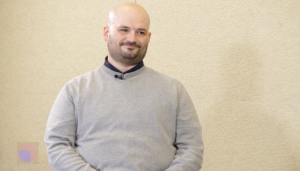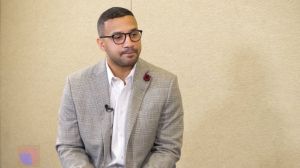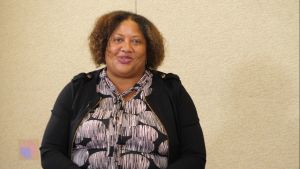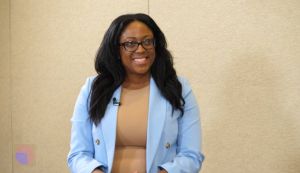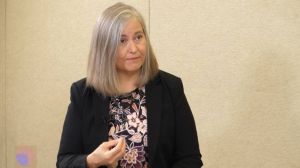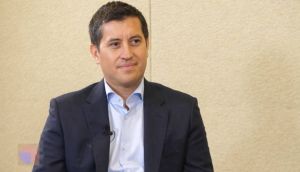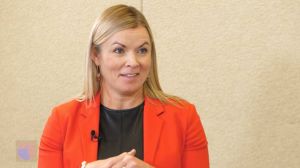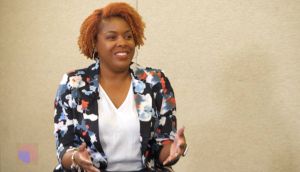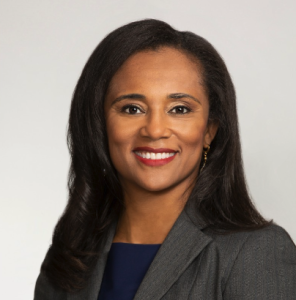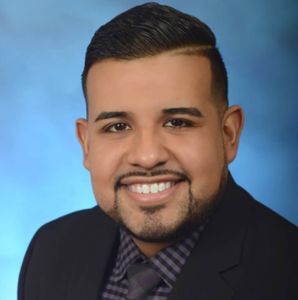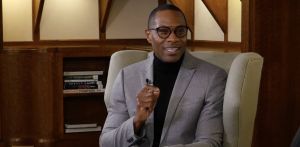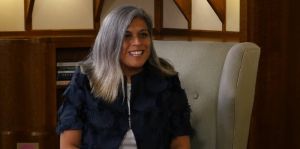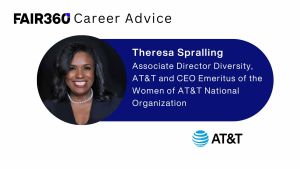Abbott’s Hubert Allen reflects on the values his parents instilled in him, how he built one of the most diverse teams at the company and its commitment to reaching young students.
Hubert Allen’s parents immigrated to the U.S. from a very small island in the West Indies; he was the first of his family born in the U.S.
After attending public schools in Boston, he attended college at Wesleyan University in Connecticut and eventually law school at Yale.
Allen started his career at law firms, first in New York and then in California. After a stint at McKesson Corporation, Allen made his way to Abbott. Today he serves as the company’s general counsel, a role he assumed when Abbott separated from its proprietary pharma business, AbbVie, in 2013.
Shane Nelson: Your parents are your first true teachers. How important was education to them?
Hubert Allen: Education to them was extremely important because they saw it as a way for us to grow up and have a very different life than they had. Being born in the ’30s in the West Indies, they were born into a very different world than the world we occupy today.
But they had a vision for what they wanted our lives to look like and a big part of that was education. They did not attend college but they were very focused on us being educated. They had a sense of how they believed the world worked. They taught us about outlook and character. They were very big on integrity.
They were very big on the idea that you should say what you’re going to do and do what you say. They were very big on the idea that you always do the right thing in any situation. They instilled an innate sense of curiosity in me and my siblings.
They also taught us perseverance, that life is not always going to be great and it will often kick you in the teeth. But the real question is: what are you going to do about it? How do you stay in the game and how do you keep moving along?
They taught us a sense of embracing challenge. They believed you should always challenge yourself, through education and through your work. Challenge yourself to always be better than you were at a given moment in time. They thought that growth was an important part of life.
When you think about it and you think about being an immigrant, all of this makes sense. It was a tremendous thing for my parents to pick themselves up from someplace where they were pretty comfortable, and move to this world that they knew nothing about. They did it because they thought we would have a better life.
But it was a major undertaking. When you do that, you have to have a sense of optimism about the world. You have to have a sense that your place in the world matters and that there are things that you can control and if you control the things that you can control, good things will come your way.
Shane Nelson: Great! I want to jump right into your diversity efforts. After the split with AbbVie, you had to build a new team and you were able to build it into one of the most diverse teams at Abbott. How were you able to do that?
Hubert Allen: There are a couple of things that worked for us.
One is Abbott’s reputation. Abbott is a company that is committed to diversity and that commitment is very visible. That is very helpful for us when building a more diverse team.
The second thing is we knew that in order to achieve diversity in our teams, we had to start with our pipeline – who is applying for, and being considered for, Abbott jobs. We were, and still are, very clear that we expect a diverse set of candidates to consider. We also focused on diversity at the law firms we use. Specifically, we focused on having them use a diverse team to present to us for every engagement. It’s not always going to be the partner leading the matter; there tended to be a fair number of diverse people working on any issue. With the associates, and with people who are on the team, we just created an expectation for them that when they put together a team for us, it must be diverse.
That’s important because often for in-house jobs, you tend to hire people that you’ve worked with. A lot of our people, the people who come to us, are people who were associates at the law firms we interact with. They know us, we know them, and when there is an opening, they put up their hands to say, “Hey, I’m interested in that.” So, if you want to build a diverse team, you have to work on making sure that, that interaction is also one that then reflects diversity.
The next thing we did is we started building connections. We built connections within the legal community where we could tell our story as an employer and as an in-house department. A lot of folks coming out of law school think about their career choices, I know I did, in three buckets. You could be a private lawyer at a law firm, you can be a government lawyer or you could become an academic. But there are other options.
For a lot of people, myself included, working as a lawyer for a company like Abbott might actually be the best option because it might marry your interest with opportunity in a sense that it requires a different skill set than you would use working for a law firm. It allows you to do things that you wouldn’t do if you were at a law firm.
We have a pretty large team in terms of geographic spread and we interact with legal systems in more than 100 countries across the globe. Doing that type of work has been very fulfilling for me.
Getting that story out there in terms of being present in events that the law firms have for their summer associates is important to us. We do some work with organizations that are committed to diversity in higher education and it’s important to us to get that story out there through those organizations.
We do some other work with social organizations. One of the things we’ve also had some success with is engaging in community service projects. One of the expectations for all of us here is that we’re going to spend a certain amount of our time doing community service and a certain amount of our time doing pro bono work. It’s a way of giving back and also a way where we get to connect with each other.
One of the things we do when doing that work is we make a point of inviting associates from our other law firms that we work with to join us. As we do that, we particularly focus on making sure that the people who join us reflect the diversity of the profession. It gives us an opportunity to interact with associates in a different way than you might at a party because you’re doing work. In doing the work, it brings out a different part of you.
It’s one thing to kind of stand around and have a conversation at work, but it’s a different thing to have conversation while you’re moving boxes or while you’re trying to accomplish a task. We found that very helpful in terms of connecting with people and getting our story out there and having folks get to know us.
Shane Nelson: Abbott does a lot to reach students early and get them interested in the industry. What are you doing to reach students early and get them interested in the legal profession?
Hubert Allen: I think this is a very important part of what we do. It’s a commitment to help build our own organization and a commitment to the profession in general. One of the things I often say, and I mean this, is that it’s incredible for me at this age to have this job that I never knew existed when I was in college, and I never knew existed even when I was in law school. As a profession, we need to get to students early on and show them that there are a lot of places depending on your interests and depending on your personality. As a profession, we perhaps are not good at that early on enough. What ends up happening is people go to law school with their vision in their mind, which is the usual courtroom law firm vision, and people for whom that isn’t attractive, they don’t end up in the profession at all. That’s a problem.
I was involved with an organization when I was in college called Sponsors for Education Opportunity. They placed students in investment banking firms. That was an important experience for me in two ways. It showed me that there was this world of investment banking that I didn’t know existed. That was very important. The second important thing was it showed me there were people like me in that profession.
With that in mind, we focus a lot on trying to interact with groups that do the same type of work. One of the groups we interact with here in Chicago is called Just the Beginning Foundation. They take students as early as middle school and try to get them to think about their life after high school, their life after college and what their careers would be.
We work with them and with other organizations like them to have their students come to Abbott Park to spend the day and learn what our lawyers do. We support them in their moot court efforts. We’ve done Q&A’s with middle school students through that organization. We get ourselves out there to show that this is a viable part of the legal profession and to show them that there are people like them who actually occupy positions of responsibility.
Shane Nelson: I’d like to turn to career advice. What advice would you give to someone on developing and maintaining a successful career?
Hubert Allen: I would give them the same advice my parents gave me. A successful career is ultimately built up on the three things: curiosity, perseverance and always challenging yourself.
The world will always shift. If you can remain curious about things so that you’re always learning, if you can always challenge yourself and if you can persevere through hard times, you’re going to be in a pretty good place in terms of having a fulfilling career.
As part of your curiosity, seek out the advice of people who have been down the road before. Mentorship and connections with people who are older than you and who know different things than you are very important part. At the end of the day, each of us are responsible for our lives and our careers, but there are a lot of people in the world who can and will help you fulfill that responsibility to yourself. You have to go through the work of seeking out those people.
And the last thing I’d say, as counterintuitive as it is, is advice that I have heard over a number of years from my father. You’ve always got to remember it’s just work. It’s part of your life, but it’s not your whole life and you have to round out your life in every way that you can. You must have interests outside of work because ultimately those interests and things outside of work, a bigger life, will make you a better person and help you do a better job at work and also to persevere through the down times.
Shane Nelson: What type of engagement do you look for in the people you sponsor?
Hubert Allen: Integrity is key to me. For the people I sponsor, I expect integrity and accountability in everything they do. I like people who are broad thinkers and in order to be a broad thinker, you need curiosity and you need to always challenge yourself. You need to think of yourself not in the context of what you are today but what it is you hope to become.


